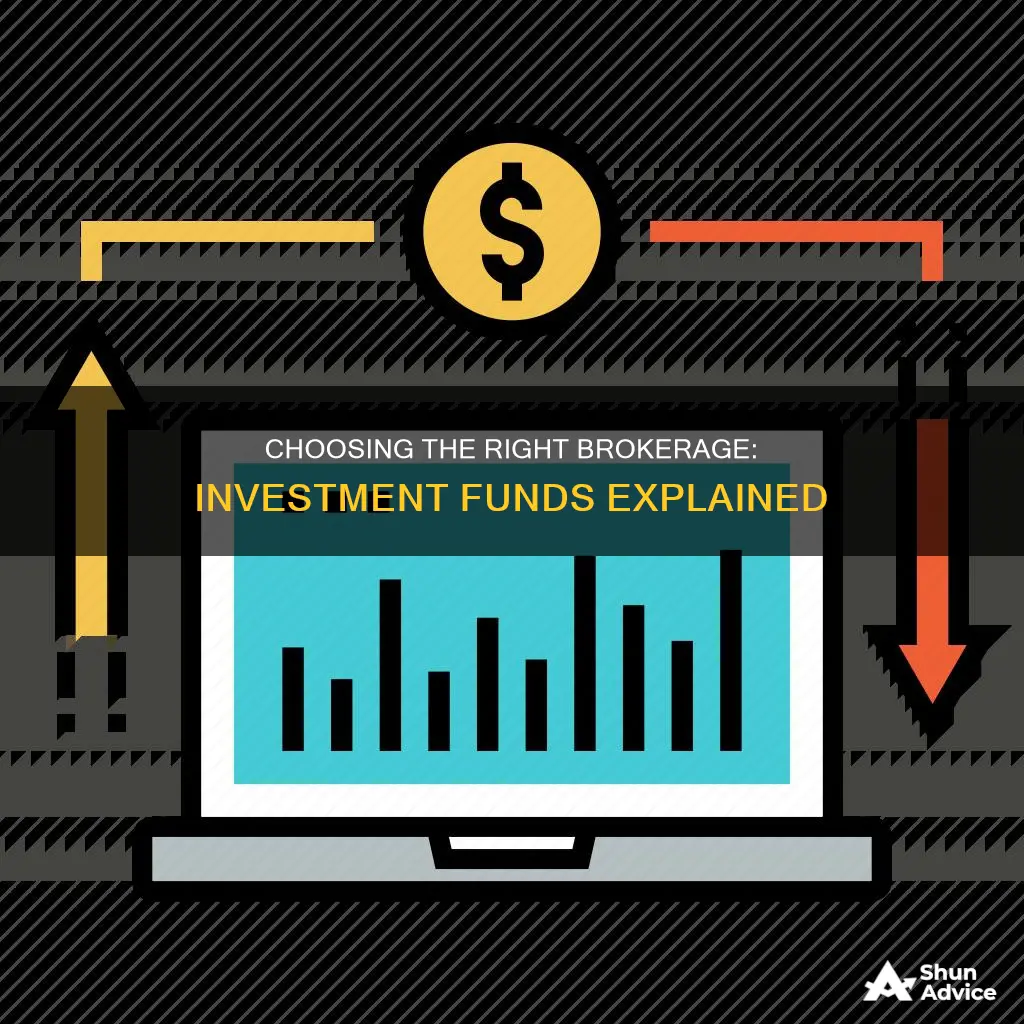
A brokerage account is a tool that enables you to invest in the stock market. It is also called a taxable investment account to differentiate it from tax-advantaged retirement accounts like 401(k)s. You can open a brokerage account with online brokers or robo-advisors. Brokerage accounts are used for day trading to earn short-term profits, as well as investing for long-term goals. Brokerage accounts are typically used to build future financial security or invest for long-term goals.
| Characteristics | Values |
|---|---|
| Purpose | Saving for a new home or car, a wedding, an emergency fund, wealth building, short-term financial goals, retirement, etc. |
| Investment types | Mutual funds, ETFs (exchange-traded funds), stocks, bonds, CDs (certificates of deposit), and more |
| Contribution limits | No contribution limits |
| Withdrawal penalties | No early withdrawal penalties |
| Tax advantages | No tax advantages for contributions or eligible withdrawals |
| Income restrictions | No income restrictions |
| Tax strategies | Tax-loss harvesting and long-term capital gains tax rates |
| Risk | Inherent risk |
| Custodian | Broker |
What You'll Learn

Cash vs. margin accounts
When signing up for a brokerage account, you may be asked if you want to open a margin account in addition to your cash account. Here is a detailed comparison between the two:
Cash Accounts
Cash accounts are probably what you think of when you picture a brokerage account, and they’re pretty straightforward. When you open a brokerage account, you’ll add money by transferring it directly from your bank or by sending a check. Once the money is with your brokerage, you can invest that cash in the stock market. Cash accounts won’t give you access to every security, but it’s still a fairly comprehensive list, including exchange-traded funds, publicly traded real estate investment trusts, and some options trades.
Margin Accounts
If a cash brokerage account is like a debit card, a margin account is like a credit card — you can buy securities with borrowed money and pay the lender back later. Trading “on margin” is an advanced trading strategy that is not appropriate for inexperienced investors. Margin accounts give you access to additional securities and strategies. Generally, you’ll need a margin account to take part in advanced options trades.
Comparison
Margin accounts can be extremely risky if you aren't sure what you’re doing. Trading from margin accounts can potentially help you amplify your returns, but there's also a risk that you could lose more than your initial investment. It’s possible to lose more than your initial investment and you’ll have to pay interest on money borrowed from your brokerage. If at any point you don’t have sufficient equity in your margin account, your brokerage can sell your securities on your behalf without telling you.
Margin accounts are powerful tools for experienced investors who fully grasp their mechanics and risks. Cash accounts, on the other hand, are the more straightforward option, limiting you to investing only the money you have.
The Mindset of Investment Fund Managers: Traits and Insights
You may want to see also

Brokerage vs. retirement accounts
Brokerage accounts are investment accounts held at a licensed brokerage firm. Investors deposit funds into their brokerage account, and the brokerage firm transacts orders for investments such as stocks, bonds, mutual funds, and exchange-traded funds (ETFs) on their behalf.
Retirement accounts, on the other hand, are tax-advantaged accounts designed for retirement savings. The two main types of retirement accounts are traditional IRAs and Roth IRAs.
Taxes: Brokerage accounts are taxable accounts, meaning investors must pay taxes on any earnings generated in the account, including capital gains and dividends. In contrast, IRAs offer tax advantages, with contributions and earnings growing tax-free or tax-deferred, depending on the type of IRA.
Contribution Limits: Brokerage accounts have no contribution limits, meaning investors can deposit and withdraw funds as often as they like with no restrictions. In contrast, IRAs have strict annual contribution limits, and early withdrawals may trigger a penalty.
Investment Selection: Brokerage accounts typically offer a wider range of investment options compared to retirement accounts, including stocks, bonds, mutual funds, ETFs, and more.
Purpose: Brokerage accounts are often used for various purposes, such as day trading, long-term investing, or saving for short-term financial goals like buying a house or car. Retirement accounts, as the name suggests, are specifically designed for retirement savings and offer tax advantages to encourage saving for the future.
Flexibility: Brokerage accounts offer more flexibility in terms of contributions and withdrawals, with no limits or penalties. Retirement accounts, on the other hand, have contribution limits and may have penalties for early withdrawals.
When deciding between a brokerage account and a retirement account, it's important to consider your financial goals and time horizon. Brokerage accounts are suitable for those seeking flexibility and short-term investments, while retirement accounts are ideal for those saving for the long term and wanting to take advantage of tax benefits.
Mutual Fund Investing: What You Need to Know
You may want to see also

Online vs. robo-advisors
Robo-advisors are a low-cost, online investing platform that employs software algorithms to create and manage investment portfolios. They are a good option for those who want to be hands-off with their investments. Robo-advisors are generally safe, but they are still subject to the same risks and market fluctuations as other brokers and investing platforms.
Online brokerages are a good choice for investors who prefer to select their own investments and execute their own trades via a website or mobile app. They are also a good option for investors who want to be hands-on with their investments.
Online Brokerages
- NerdWallet: Online brokerage account that enables you to buy and sell investments.
- Robinhood: Online broker that offers commission-free trading on stocks, ETFs, and options.
- Charles Schwab: Major name in online brokerage that offers commission-free trading.
- Fidelity: Online broker that offers a wide variety of mutual funds with no transaction costs.
- ETrade: Online broker that offers commission-free trading and a wide variety of mutual funds.
Robo-Advisors
- Wealthfront: Robo-advisor with a $500 account minimum and a 0.25% management fee.
- Betterment: Robo-advisor with a $10 account minimum and a 0.25% management fee.
- Vanguard Digital Advisor: Robo-advisor with a $3,000 account minimum and a 0.2% management fee.
- SoFi Automated Investing: Robo-advisor with a $1 account minimum and no management fee.
- Acorns: Robo-advisor with a $5 monthly fee and a $5 account minimum.
Both online brokerages and robo-advisors have their own advantages and disadvantages. Online brokerages are better for those who want to be hands-on with their investments, while robo-advisors are better for those who want to be hands-off. Online brokerages usually have higher fees, while robo-advisors have lower fees. Online brokerages may also offer more investment options, while robo-advisors may have more limited options. Ultimately, the decision between an online brokerage and a robo-advisor depends on your personal preferences, investment goals, and risk tolerance.
Bond Fund Investment: What Percentage is Smart to Invest?
You may want to see also

Full-service vs. discount brokers
When choosing a brokerage account, investors can select from a variety of brokerage firms, including full-service and discount brokers. Here's a detailed comparison between the two to help you decide which one suits your needs:
Full-Service Brokers:
- Definition: Full-service brokers are traditional brokers that offer a wide range of services, including advisory services, relationship managers, and financial planning. They often have physical branches across the country and provide both online and offline customer support. Examples include Merrill Lynch and Morgan Stanley.
- Cost: Full-service brokers charge higher fees and commissions due to the extensive services they provide. The cost can be a percentage of each trade executed or a flat fee per trade.
- Target Investors: Full-service brokers are ideal for busy individuals who don't have the time or knowledge to manage their investments actively. They are also suitable for novice investors who need assistance and guidance in the trading process.
- Services: In addition to providing a trading platform, full-service brokers offer investment advice. They may have research departments that provide in-depth analysis on stocks, market sectors, and other areas. They can also facilitate securities trades, portfolio management, and wealth management for their clients.
- Pros: High level of personalised service, extensive resources, and convenience for busy individuals.
- Cons: Higher costs, potential conflicts of interest due to sales-based compensation for brokers, and possible incentives to encourage trading or investments that may not align with the client's best interests.
Discount Brokers:
- Definition: Discount brokers are typically online brokerage firms that provide a self-service platform for investors to buy and sell stocks and other investments. They usually have low commissions and trading fees, with many offering £0 trading fees. Examples include Charles Schwab, Fidelity, and Robinhood.
- Cost: Discount brokers have lower costs, often charging flat fees per trade or even offering commission-free trading.
- Target Investors: Discount brokers are ideal for investors who are comfortable doing their own research and making their own investment decisions. They are also suitable for those working with independent financial advisors.
- Services: Discount brokers primarily provide an online trading platform, with some offering additional educational tools and resources. They may also provide access to a wide range of financial products, including mutual funds, stocks, and ETFs.
- Pros: Lower costs, more control over investment decisions, and access to a wide range of financial products.
- Cons: Less personalised service, lack of investment advice, and a daunting array of choices in terms of fees, products, and services.
In summary, the choice between a full-service and a discount broker depends on your level of investment knowledge, the amount of time you can dedicate to managing your investments, and your preference for personalised advice versus lower costs.
Index Funds: How Much Should You Invest?
You may want to see also

Brokerage account types
Brokerage accounts are typically used to build future financial security or invest for long-term goals. There are several types of brokerage accounts and brokerage firms, giving investors the chance to choose the model that best suits their financial needs. Here are some of the most common types of brokerage accounts:
Online Brokerage Account
An online brokerage account is suitable for those who want to purchase and manage their investments. It enables investors to buy and sell investments through the broker's website. Discount brokers offer a range of investments, including stocks, mutual funds, and bonds. Many online brokers also offer research and analysis tools to help investors make informed decisions.
Managed Brokerage Account
A managed brokerage account comes with investment management from a human investment advisor or a robo-advisor. A robo-advisor is a low-cost alternative to a human investment manager, using computer programs to choose and manage your investments based on your goals and timeline.
Full-Service Brokerage Account
Full-service brokerage firms, such as Merrill, Morgan Stanley, and Wells Fargo Advisors, offer extensive investment advice and other services but charge higher fees. Financial advisors help clients develop investment plans, execute transactions, monitor investments, and more. Full-service brokerage accounts charge either commissions on trades or advisor fees.
Discount Brokerage Account
Discount brokerage firms, such as Charles Schwab, Fidelity, and E*Trade, offer lower fees but fewer services. This type of account may be suitable for investors who want to keep costs low and execute trades using easy-to-use online trading platforms.
Robo-Advisor Account
Robo-advisor accounts use algorithms to select investments, usually restricted to mutual funds or ETFs. The cost is typically around 0.25% to 0.50% of assets under management per year. Robo-advisors are a good option for those new to investing or experienced investors who prefer a hands-off approach.
Cash Brokerage Account
A cash brokerage account requires you to deposit cash to start trading and limits your options to basic trades such as purchasing stock. Short selling is not possible within a cash account.
Margin Brokerage Account
With a margin account, you can borrow money from your brokerage to make additional purchases. The securities in your account serve as collateral, and you will be charged interest on the loan. Margin accounts offer more flexibility but come with some risk, so they may not be suitable for beginners.
Key Factors for Investors to Consider in Mutual Funds
You may want to see also
Frequently asked questions
A brokerage account is an investment account held at a licensed brokerage firm. You can use it to buy and sell investment securities such as stocks, bonds, mutual funds, and exchange-traded funds (ETFs). Brokerage accounts are also called "taxable investment accounts" to differentiate them from tax-advantaged retirement accounts.
Brokerage accounts offer several benefits, including:
- No contribution limits
- No early withdrawal penalties
- Wide range of investments
- Potential tax strategies, like tax-loss harvesting and long-term capital gains tax rates
While brokerage accounts offer flexibility and a wide range of investment options, they also come with certain risks. These include:
- Investment risk: The value of your investments may decrease due to market fluctuations or poor investment decisions.
- Tax implications: You will generally owe taxes on dividends, interest income, and capital gains from the sale of investments.
- Limited protection: Cash and securities in a brokerage account are typically insured by the Securities Investor Protection Corporation (SIPC) up to $500,000, but this does not cover investment losses.
When choosing a brokerage account, consider the following factors:
- Investment style: Choose a broker that aligns with your investment style, such as active trading or a buy-and-hold approach.
- Fees and charges: Be aware of the fee structure, including commissions, account maintenance fees, withdrawal fees, and other charges.
- Services offered: Decide if you need a full-service broker that provides advice and recommendations or a discount broker for executing trades only.
- Regulatory compliance: Ensure the broker is licensed, registered with the SEC, and a member of recognized organizations like FINRA and SIPC.







